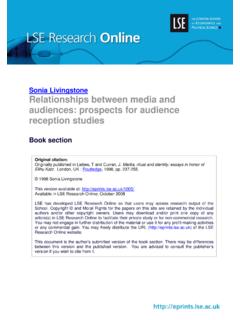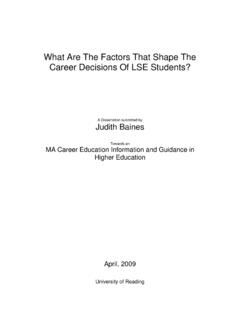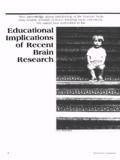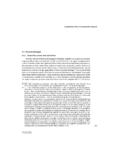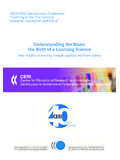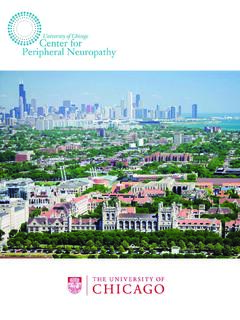Transcription of Individual Choice and Social Exclusion - LSE Research Online
1 I Individual Choice and Social Exclusion Julian Le Grand Contents 1 Exclusion , Democracy and 2 Choice and 4 Conclusion .. 9 11 CASE paper 75 Centre for Analysis of Social Exclusion December 2003 London School of Economics Houghton Street London
2 WC2A 2AE CASE enquiries tel: 020 7955 6679 iiCentre for Analysis of Social Exclusion The ESRC Research Centre for Analysis of Social Exclusion (CASE) was established in October 1997 with funding from the Economic and Social Research Council. It is located within the Suntory and Toyota International Centres for Economics and Related Disciplines (STICERD) at the London School of Economics and Political Science, and benefits from support from STICERD.
3 It is directed by Howard Glennerster, John Hills, Kathleen Kiernan, Julian Le Grand, Anne Power and Carol Propper. Our Discussion Paper series is available free of charge. We also produce summaries of our Research in CASE briefs, and reports from various conferences and activities in CASE reports. To subscribe to the CASE paper series, or for further information on the work of the Centre and our seminar series, please contact the Centre Administrator, Jane Dickson, on: Telephone: UK+20 7955 6679 Fax: UK+20 7955 6951 Email: Web site: Julian Le Grand All rights reserved.
4 Short sections of text, not to exceed two paragraphs, may be quoted without explicit permission provided that full credit, including notice, is given to the source. iiiEditorial Note Julian Le Grand is the Richard Titmuss Professor of Social Policy at the London School of Economics and a co-director of the ESRC Research Centre for Analysis of Social Exclusion . Abstract Why is Social Exclusion a problem? What about voluntary Social Exclusion when an Individual chooses to exclude him or herself from the wider society? Brain Barry has addressed these questions in a recent CASE book, arguing that Social Exclusion , voluntary or involuntary, offends against Social justice and Social solidarity.
5 This paper contends that Barry s arguments are weak for voluntary Social Exclusion and argues that, perhaps surprisingly, a better case can be made for treating voluntary Social Exclusion as a problem on welfarist grounds. JEL number: I30 Key words: Social Exclusion , poverty, Choice 1 Introduction Why is Social Exclusion a problem? Why should we care about an Individual who does not participate in key activities of the society in which he or she lives one definition of the socially excluded (Burchardt, Le Grand and Piachaud, 2002, )? Does our concern arise from some kind of simple utilitarian or welfarist calculus: the excluded are miserable, and therefore we need to include them in society so as raise their welfare and thereby promote the greatest happiness for the greatest number?
6 But what if the socially excluded are not in fact miserable? After all, not everyone necessarily wishes to participate in the key activities of society , whatever these may be. In particular, what if an Individual or a group of individuals have voluntarily chosen to exclude themselves? What of the recluse who prefers solitude to human company, the religious sect that values its exclusivity, the young men on a run down public housing estate who prefer to join a criminal gang rather than go to university? At the other end of the Social scale, what of the rich who lock themselves away in gated communities?
7 All of these individuals and groups may not be participating in the key activities of society; but do they all constitute a Social problem? If so, is it the same kind of Social problem as those who are socially excluded for reasons beyond their control, and what kind of problem is that? Brian Barry has addressed some of these questions in a recent contribution to a CASE study of Social Exclusion (Barry, 2002). There he related Social Exclusion to the issues of justice and democracy. But the questions are also of even more general concern. The problem of the relationship between Choice , poverty and Social Exclusion has bedevilled academic political and popular debate on the issue for (literally) millennia.
8 As far back as the Roman Empire politicians and policy-makers have wanted to distinguish between the undeserving poor (those poor from Choice ) from the deserving poor (those who are poor through no fault of their own). With the current resurgence of belief in Individual agency and responsibility (Deacon and Mann, 1999), the political interest in attaching notions of responsibilities to rights, and the contributions of Amartya Sen (1994, 1995) and others emphasising the importance of the distribution of capabilities rather than actual incomes, the debate concerning the importance of Choice and its relationship to distributional outcomes has re-ignited.
9 So in this paper I want to pursue the general question as to the relationship between Individual Choice and Social Exclusion , and in doing so to shed light on the question as to why Social Exclusion is a problem worthy of concern. I begin with Barry s arguments as to why Social Exclusion is wrong from the points of view of justice and democracy, and relate these to the question of Choice . I conclude that, whatever their merits as arguments for labelling involuntary 2 Social Exclusion as a problem, they do not provide a strong case for treating voluntary Social Exclusion as one. I then demonstrate that, perhaps surprisingly, a better case can be made on welfarist grounds for viewing some forms of voluntary Social Exclusion as a proper subject of Social concern, especially that with long-term implications for individuals futures.
10 There is a brief concluding section. Exclusion , Democracy and Justice Brian Barry begins his discussion of why Social Exclusion is undesirable with a definition of Social Exclusion originally put forward by the present author, as follows: An Individual is socially excluded if (a) he or she is geographically resident in a society, (b) he or she cannot participate in the normal activities of citizens in that society, and (c) he or she would like to so participate, but is prevented from doing so by factors beyond his or her control (Burchardt, Le Grand and Piachaud, 1999, ). Under this interpretation, voluntary Social Exclusion is excluded (so to speak), because of condition (c).




